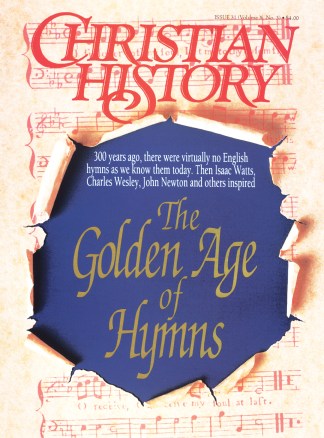Questions for Today
1. What is your favorite hymn from “The Golden Age of Hymns”? (See the Contents for some still-popular candidates.) What makes this hymn important to you?
2. In what ways is today’s outpouring of “praise music” like the proliferation of hymns 250 years ago? In what ways is it different? (For background, read “The Hymn Explosion”.)
3. Psalms and early hymns were often “lined out,” with every line said by a leader before it was sung by the congregation. (See “The Hymn Explosion” for a fuller explanation.) This often created a disjointed feeling to worship. What musical practices in today’s churches do you think detract from worship? Why?
4. What objections to contemporary Christian music have you heard? How do these reasons compare to the objections to hymns two centuries ago? (See “Irrational Music Sung by a Mob of Extremists”.)
5. Some early hymns incorporated phrases from secular poetry or were set to bar-room tunes. In what ways does music written by Christians today “borrow” from the broader culture? What are the advantages and disadvantages of this approach?
6. Do you think today’s praise choruses will still be sung 250 years from now—in the year 2241? Why?
Recommended Resources
For readers who want to study further, here are key resources selected by Dr. Paul Westermeyer, professor of Church Music at Luther Northwestern Theological Seminary in St. Paul, Minnesota.
• Louis F. Benson, The English Hymn: Its Development and Use in Christian Worship (Richmond: John Knox, 1962, reprinted from 1915 edition). Though a bit tedious and dated, this volume still provides valuable detail. Chapters II through VII survey the eighteenth century, from Baxter through Watts, Wesley, and the evangelicals.
• Henry Escott, Isaac Watts: Hymnographer (London: Independent Press, 1962). A responsible, somewhat stuffy treatment of Watts and his context.
• Harry Eskew and Hugh T. McElrath, Sing with Understanding (Nashville: Broadman, 1980). Includes a thumbnail sketch of Watts, Wesley, and the Evangelical Revival.
• Alfred Burton Haas, “Charles Wesley,” The Papers of the Hymn Society of America, XXII (Springfield: The Hymn Society of America, 1957). A sketch of Charles Wesley’s life and work.* [* For information, write The Hymn Society in the United States and Canada, P. O. Box 30854, Texas Christian University, Fort Worth, TX 76129 ]
• The Hymn 39:4 (October, 1988). A special issue of the quarterly journal of the Hymn Society in the United States and Canada. Five articles are devoted to Wesleyan hymnody and its music.* [* For information, write The Hymn Society in the United States and Canada, P. O. Box 30854, Texas Christian University, Fort Worth, TX 76129 ]
• John Henry Johansen, “The Olney Hymns,” The Papers of the Hymn Society of America, XX (Springfield: The Hymn Society of America, 1956). An overview of John Newton, William Cowper, and their hymnbook, the source of “Amazing Grace!” and “God Moves in a Mysterious Way.”* [* For information, write The Hymn Society in the United States and Canada, P. O. Box 30854, Texas Christian University, Fort Worth, TX 76129 ]
• John Julian, A Dictionary of Hymnology (Dover, 1957; republication of the revised edition of 1907). Many entries and several articles from this monumental publication of a century ago still are useful. See especially “Methodist Hymnody,” “Watts, Isaac,” and “The Wesley Family.”
• Robin A. Leaver, “British Hymnody from the Sixteenth through the Eighteenth Centuries,” in The Church Hymnal Companion, Raymond F. Glover, ed. (New York: Church Hymnal Corp., 1990). A valuable new study.
• Bernard Lord Manning, The Hymns of Watts and Wesley: Five Informal Papers (London: Epworth, 1942). Dated, but very perceptive and well-written.
• J. E. Rattenbury, The Eucharistic Hymns of John and Charles Wesley (London: Epworth, 1948). A standard.
• William J. Reynolds and Milburn Price, A Survey of Christian Hymnody (Carol Stream, IL: Hope Publishing, 1987). For a quick overview, see Chapter 4: “English Hymnody, I.”
• Eric Routley, Christian Hymns: An Introduction to Their Story (Princeton, NJ: Prestige Publications, n.d.). These cassette tapes sketch the history of Christian hymnody in Routley’s animated and opinionated way. Cassette 4 covers Watts and Wesley.
• John Wesley, A Collection of Hymns for the Use of People Called Methodists (London: J. Paramore, 1780). The book Wesley said he was “for many years … importuned to publish.” It can be found in The Works of John Wesley, volume 7, eds. Franz Hildebrandt, Oliver Beckerlegge, and James Dale (Oxford: Clarendon, 1983).
• John Wesley, A Collection of Psalms and Hymns (Charles-Town: Lewis Timothy, 1737; facsimile reprint, Nashville: Parthenon, 1990). The first hymnal by John Wesley, the first (as opposed to a psalm book) printed in America, and the first published for the Church of England. For reflections about this pocket-sized book, see Carlton R. Young, “John Wesley’s Charlestown Collection of Psalms and Hymns,” The Hymn 41:4 (October, 1990).* [* For information, write The Hymn Society in the United States and Canada, P. O. Box 30854, Texas Christian University, Fort Worth, TX 76129 ]
Copyright © 1991 by the author or Christianity Today/Christian History magazine. Click here for reprint information on Christian History.










